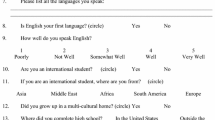Abstract
This research explores the influence of five ethical frameworks on business students’ decision regarding the resolution of an ethical dilemma in a simulation. The frameworks of ethical tests are: Utilitarianism (the greatest good for the greatest number); Self-interest (maximizing the benefits to the individual); Categorical Imperative (universal principles of morality); Legality (rules, laws, etc.); and Light of Day (possibility of one’s actions being discovered). Results showed that the strongest influences were the Categorical Imperative, Self-Interest, and Legality. Among demographic variables, only age was related to the students’ decision or the ethical tests.
Similar content being viewed by others
References
Aristotle. 1961.The Nicomachean Ethics. Trans. Sir David Ross. London: Oxford UP.
Barry, V. 1986.Moral Issues in Business. 3rd ed. Belmont: Wadsworth.
Bentham, J. 1970 (1789).An Introduction to the Principles of Morals and Legislation. London: Athlone Press.
Cohen, J., and P. Cohen. 1975.Applied Multiple Regression/Correlation Analysis for the Behavioral Sciences. Hillsdale: Lawrence Erlbaum.
DeGeorge, R. T. 1986.Business Ethics. 2nd. ed. New York: MacMillan.
Gross, B. R., ed. 1977.Reverse Discrimination. Buffalo: Prometheus Books.
Henderson, V. E. 1982. “The Ethical Side of Enterprise.”Sloan Management Review. 23.3: 37–47.
Hoffman, W. M., and J. M. Moore. 1984.Business Ethics. New York: McGraw Hill.
Kant, I. 1969 (1785).Foundations of the Metaphysics of Morals: Text and Critical Essays. Ed. R. P. Wolff. Indianapolis: Bobbs-Merrill.
Matthews, J. B., K. E. Goodpaster, and L. L. Nash. 1984.Policies and Persons. New York: McGraw Hill.
McPherson, T. 1970.Social Philosophy. London: Van NostrandReinhold.
Mill, J. S. 1970 (1863).Utilitarianism. New York: Liberal Arts Press.
Nunnally, J. C. 1978.Psychometric Theory. 2nd. ed. New York: McGraw Hill.
Pagano, A. M. 1987. “Criteria for Ethical Decision Making.” Paper presented at the National Academy of Management Meeting, New Orleans, LA.
Peters, C, and T. Branch. 1972.Blowing the Whistle: Dissent in the Public Interest. New York: Praeger.
“A Question of Ethics.” 1987.Wall Street Journal September 18: 2.1.
Rawls, J. 1971.A Theory of Justice. Cambridge: Belknap Press.
Steiner, G. A., and J. F. Steiner. 1985.Business, Government and Society. 4th. ed. New York: Random House.
Thomson, J. J. 1984. “Hiring Practices: Preferential Hiring and Reverse Discrimination.”Business Ethics. Ed. W. M. Hoffman and J. M. Moore. New York: McGraw Hill.
Walters, K. D. 1985. “Your Employee’s Right to Blow the Whistle.”Business Ethics. Ed. W. M. Hoffman and J. M. Moore. New York: McGraw Hill.
Wartzman, R. 1987. “Nature or Nurture? Study Blames Ethical Lapses on Corporate Goals.”Wall Street Journal October 9: 27.
Author information
Authors and Affiliations
Rights and permissions
About this article
Cite this article
Dahl, J.G., Mandell, M.P. & Barton, M.E. Ethical frameworks of “Tomorrow’s Business Leaders”. Int. J. Value Based Management 1, 65–81 (1988). https://doi.org/10.1007/BF03184883
Issue Date:
DOI: https://doi.org/10.1007/BF03184883



